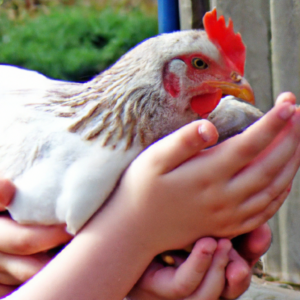
Have you ever wondered how to introduce chickens to a chicken tractor or mobile coop? It can be a daunting task, but fear not, for we have some friendly tips to help you navigate this process smoothly. Whether you’re a beginner or experienced chicken farmer, these steps will ensure a seamless transition for your feathered friends. So, grab your notepad and let’s get started on creating a comfortable and stress-free environment for your new flock.

Selecting the Right Time for Introducing Chickens to a Chicken Tractor or Mobile Coop
Considering the Age of the Chickens
When introducing chickens to a chicken tractor or mobile coop, it is important to consider the age of the chickens. Younger chicks require a warmer environment and may need additional care during the transition to the coop. It is recommended to wait until the chicks are at least six weeks old before moving them to the tractor or coop. This ensures that they are strong enough to handle the outdoor conditions and adapt to their new surroundings.
Taking into Account the Weather Conditions
Another important factor to consider is the weather conditions. It is crucial to choose a time when the weather is not too hot or too cold for the chickens. Extreme temperatures can put stress on the birds and affect their health and well-being. Ideally, a mild and stable weather period, such as spring or fall, is the best time to introduce chickens to a new environment. This allows them to adjust comfortably without facing extreme weather challenges.
Allowing Sufficient Time for Acclimation
It is essential to give your chickens enough time to acclimate to their new surroundings before fully integrating them into the chicken tractor or mobile coop. This can be done by initially placing the tractor or coop in a fenced-off area within your yard. This will allow the chickens to get used to the sights, sounds, and smells of their new home. Gradually increase their time outside in the tractor or coop each day until they are ready to roam freely. Patience is key during this process to ensure the well-being and success of your flock.
Preparing the Chicken Tractor or Mobile Coop for the Chickens
Cleaning and Disinfecting the Coop
Before introducing the chickens, it is crucial to thoroughly clean and disinfect the chicken tractor or mobile coop. This will help eliminate any potential pathogens or diseases that may harm the birds. Use a mild detergent and water to clean all surfaces, including nesting boxes and perches. Once cleaned, disinfect the coop with a poultry-safe disinfectant. This step is vital in creating a clean and healthy environment for your chickens.
Providing Adequate Ventilation
Good ventilation is essential for the health and well-being of your chickens. Ensure that your chicken tractor or mobile coop has proper ventilation to allow for fresh air exchange and prevent the buildup of ammonia from droppings. This can be achieved by installing windows, vents, or openings that promote air circulation. Good ventilation also helps regulate temperature and humidity levels inside the coop, which contributes to the overall comfort of your feathered friends.
Setting Up Nesting Boxes and Perches
Chickens need appropriate nesting spaces to lay their eggs and perches to roost. Install nesting boxes in a quiet and secluded area of the coop, providing one box for every four to five hens. Line the nesting boxes with clean straw or shavings to create a comfortable and inviting environment for the hens. Additionally, provide perches at varying heights to accommodate the natural roosting behavior of the chickens. This will ensure their comfort and help maintain their overall health.

Creating a Suitable Environment Inside the Chicken Tractor or Mobile Coop
Laying Bedding Material
To create a comfortable and hygienic environment for your chickens, it is important to lay bedding material inside the chicken tractor or mobile coop. Some popular options for bedding include straw, wood shavings, or pine pellets. Spread a layer of bedding material on the floor of the coop, ensuring a depth of at least two inches. This will provide cushioning for the chickens’ feet, absorb moisture, and help control odors. Regularly clean and replace the bedding to maintain a clean and healthy living space for your flock.
Placing Food and Water Containers
Proper placement of food and water containers is essential to ensure easy access for the chickens. Position the containers in an easily accessible area of the chicken tractor or mobile coop, away from nesting boxes and perches. This prevents contamination of the food and water sources. Use sturdy containers that are easy to clean and refill. It is important to regularly check and clean the containers to prevent the growth of bacteria and promote the well-being of your feathered friends.
Adding Enrichment Elements
Chickens are curious and active creatures that require mental stimulation and opportunities for physical exercise. Enhance their environment by providing enrichment elements inside the chicken tractor or mobile coop. This can include items such as perches, hanging toys, or even a dust bath area. These elements not only provide entertainment and mental stimulation for the chickens but also promote natural behaviors and reduce stress levels. Remember to regularly rotate and change these elements to keep the environment engaging for your feathered friends.
Introducing Chickens Gradually to the Chicken Tractor or Mobile Coop
Utilizing a Coop Integration Method
When introducing new chickens to an existing flock, utilizing a coop integration method can help ease the process. This involves introducing the new chickens gradually to the coop, allowing them to interact with the existing flock through a wire barrier. This method allows the birds to become familiar with each other’s presence while preventing any physical aggression or injuries. Over time, the chickens will establish a pecking order and become more comfortable with each other, leading to a harmonious flock.
Dividing the Coop with a Temporary Barrier
To ensure a smooth introduction process, consider dividing the chicken tractor or mobile coop with a temporary barrier. This can be a wire fence or mesh that separates the new chickens from the existing flock initially. This allows them to adjust to their new environment without direct physical contact. Through the barrier, the birds can acclimate to the sights and sounds of the flock, reducing stress and potential conflicts. After a few days, when the birds appear comfortable, the barrier can be slowly removed to allow for direct interaction.
Using Netting or Fencing for Partial Integration
If you are introducing chickens that are relatively young or smaller in size compared to the existing flock, using netting or fencing can be a helpful strategy. This allows for partial integration while keeping the younger or smaller chickens protected from potential aggression or injuries. By sectioning off a portion of the chicken tractor or mobile coop with netting or fencing, you can create a separate area where the new chickens can safely interact and socialize with the older members of the flock. This gradual integration approach promotes a smoother transition and minimizes stress for all the birds involved.

Monitoring and Ensuring the Well-being of the Chickens
Checking for Signs of Stress or Illness
During the introduction process and throughout the chickens’ time in the chicken tractor or mobile coop, it is crucial to monitor their behavior and health. Keep an eye out for any signs of stress or illness, such as decreased appetite, abnormal droppings, lethargy, or aggression. Promptly address any concerns by isolating sick or injured birds and seeking veterinary advice if necessary. Being vigilant and attentive to the well-being of your flock is essential in providing them with a healthy and safe living environment.
Maintaining Proper Lighting and Temperature
To ensure the well-being and productivity of your chickens, it is important to maintain proper lighting and temperature conditions inside the chicken tractor or mobile coop. Provide natural daylight or artificial lighting to ensure an appropriate photoperiod for egg production. Additionally, monitor the temperature inside the coop, especially during extreme weather conditions. Use insulation, fans, or heaters to regulate the temperature and create a comfortable environment for your feathered friends.
Providing Regular Feed and Water
A key aspect of ensuring the well-being of your flock is providing regular access to feed and water. Monitor the feed and water containers daily, refilling them as needed to ensure a continuous supply. Chickens require a balanced diet to maintain optimal health and productivity. Provide a high-quality chicken feed that meets their nutritional needs, supplemented with appropriate treats and fresh greens. Access to clean and fresh water is also crucial, as chickens need to stay hydrated for their overall well-being.
Addressing Potential Issues During the Introduction Process
Handling Aggression or Bullying
During the introduction process, it is not uncommon for chickens to display aggression or engage in bullying behavior. If any aggressive behaviors become problematic, it is important to intervene promptly to prevent injuries. Provide additional hiding spots, perches, or separated areas within the chicken tractor or mobile coop to give each bird a chance to escape from aggressive behaviors. In severe cases, consider removing the most aggressive bird temporarily to allow the others to establish a peaceful pecking order.
Addressing Health Concerns or Injuries
Even with careful introduction methods, there is always a risk of health concerns or injuries during the transition period. Regularly inspect your chickens for any signs of illness or injuries, such as wounds or lameness. If you notice any issues, isolate the affected bird, provide appropriate medical care, and monitor their progress. Prompt attention to health concerns helps to maintain the overall well-being of the flock and prevent the spread of any potential diseases.
Adjusting Feed and Water Stations if Necessary
During the introduction process, some chickens may exhibit submissive behavior and may have difficulty accessing food and water stations. It is important to observe their behavior and ensure that all birds have equal access to these essential resources. Consider adding additional feed and water stations within the chicken tractor or mobile coop to accommodate the entire flock. This eliminates competition and allows for a smoother transition and overall harmony among your feathered friends.
Promoting Healthy Interactions and Socialization Among Chickens
Facilitating Introduction of New Chickens
Introducing new chickens to an existing flock can be a delicate process, but it is essential for a healthy and balanced flock dynamic. Start by placing the new chickens in a separate space within the chicken tractor or mobile coop, allowing them to observe and interact with the existing flock through a barrier. This gradual introduction helps the birds become familiar with each other’s presence without direct physical contact. After a proper acclimation period, remove the barrier and monitor their interactions, stepping in if any aggression becomes excessive.
Encouraging Natural Pecking Order Establishment
Chickens naturally establish a pecking order to determine their social hierarchy within the flock. As farmers or backyard chicken keepers, it is important to allow this process to occur naturally. Avoid interfering with the pecking order establishment, as it helps maintain order and reduces conflict among the chickens. As long as the interactions remain within reasonable limits and do not lead to severe injuries or stress, it is best to let the birds determine their hierarchy without interference.
Ensuring Sufficient Space for Roaming and Activities
To promote healthy interactions and socialization among the chickens, it is important to provide sufficient space within the chicken tractor or mobile coop. Overcrowding can lead to stress, aggression, and territorial behaviors. Ensure that each bird has enough space to move around freely, stretch their wings, and engage in natural activities. Adequate space allows the chickens to establish their territories and reduces the likelihood of conflicts. Providing ample space also contributes to their overall physical and mental well-being.
Establishing Routines and Practices for Chicken Tractor or Mobile Coop Management
Creating a Daily Feeding and Cleaning Schedule
Establishing a daily feeding and cleaning schedule is crucial for the proper management of a chicken tractor or mobile coop. Develop a routine that includes feeding your chickens at the same time each day and refreshing their water supply. This helps maintain a consistent schedule that the chickens become accustomed to, reducing stress and ensuring they receive the nutrition and hydration they need. In addition, regular cleaning of the coop, including removing soiled bedding and droppings, helps maintain a clean and healthy environment for your flock.
Maintaining Regular Health Checks and Treatments
Regular health checks are essential for the overall well-being of your chickens. Schedule routine check-ups to monitor their health status, assess body condition, check for parasites, and administer any necessary vaccinations or treatments. Regularly inspect their feathers, eyes, beaks, and feet for any signs of abnormalities or injuries. Implementing a proactive approach to their health ensures early detection and prompt intervention when necessary, preventing potential health issues from escalating.
Implementing Coop Rotation or Moving Strategies
To maximize the benefits of a chicken tractor or mobile coop, implementing coop rotation or moving strategies can be beneficial. This involves periodically moving the tractor or coop to different areas of your yard or pasture. Coop rotation helps avoid issues such as overgrazing, excessive waste accumulation, and parasite build-up in one location. By allowing the chickens access to fresh forage and reducing the risk of disease transmission, coop rotation promotes a healthier and more sustainable environment for your flock.
Harvesting Benefits of the Chicken Tractor or Mobile Coop
Collecting Fresh Eggs and Monitoring Laying Patterns
One of the significant benefits of having chickens in a chicken tractor or mobile coop is the ability to enjoy fresh eggs. Regularly collect eggs from the nesting boxes, ensuring they are clean and intact. Monitor the laying patterns of your chickens to identify any irregularities that may indicate health issues or stress. Being attentive to their egg production helps you ensure the well-being of your flock and provides you with the joy of harvesting fresh, delicious eggs.
Utilizing Fertilizer from Chicken Manure
Chicken manure is an excellent source of natural fertilizer for your garden or vegetable patch. The manure is rich in essential nutrients that contribute to the growth and productivity of plants. Regularly clean the chicken tractor or mobile coop, collecting the droppings and soiled bedding. Compost the manure with other organic matter to create nutrient-rich compost that can be used to nourish your plants. This sustainable practice helps reduce waste and supports the growth of healthy and thriving plants.
Enjoying the Natural Pest Control Abilities of Chickens
Chickens have a natural instinct to forage and hunt for pests, making them effective natural pest controllers. By allowing your chickens access to different areas of your yard or pasture, they can help reduce pests such as insects, slugs, and snails. This not only benefits your plants and gardens but also saves you from using harmful pesticides. Embracing the natural pest control abilities of your feathered friends promotes a more eco-friendly and sustainable approach to gardening and pest management.
Summary and Conclusion
Introducing chickens to a chicken tractor or mobile coop requires careful consideration and preparation. By selecting the right time, ensuring appropriate accommodations, and promoting healthy interactions, you can create a comfortable and secure environment for your flock. Regular monitoring, addressing potential issues, and implementing best management practices will contribute to the well-being and productivity of your chickens. Harvesting the benefits of the chicken tractor or mobile coop, such as fresh eggs, natural fertilizer, and pest control, adds to the joy and satisfaction of raising chickens. With proper planning and attentive care, you can create a fulfilling and successful experience for both you and your feathered friends in the chicken tractor or mobile coop.







